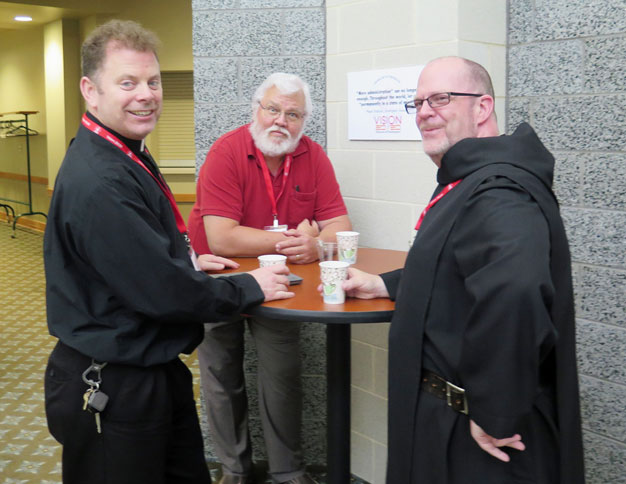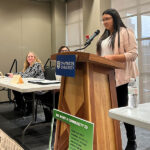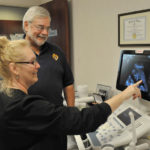
From left, Father Jeff Belger, Deacon Joe Dvorak and Father Brendan Moss, OSB, talk during a break at the Vision 20/20 Convocation.
By Lindsay Steele
The Catholic Messenger
At the Last Supper, Jesus gave his disciples an explanation and example of what the Eucharist should be. As a noun, it is the body and blood of Jesus Christ. As a verb, it is a call to be the church of Jesus Christ and to participate in the ministry of evangelization. Jesus exemplified the latter by washing the “dirty, smelly” feet of the disciples, said Father Brendan Moss, OSB, of Saint Meinrad Archabbey in Indiana and an educator at the Seminary and School of Theology. “If we want to be evangelists we have to make room in our life, in our ministry and in our liturgical life for people who are ‘stinky.’”
Father Moss offered this message last summer during the Vision 20/20 Convocation at St. Ambrose University-Davenport in his presentation, Liturgical and Eucharistic Evangelization. Father Moss shared some thoughts on the work of evangelization and traced its history “so we can root ourselves in what the church is talking about when it comes to evangelization, particularly the new evangelization.”
He described evangelization as “proclaiming the Gospel with joy and ministering — or sharing- — its mercy.” However, evangelization is a relatively new word in the Catholic Church. Originally, evangelization was limited to the work of missionaries. The church had a long tradition of ministering to people who had never heard the Gospel message. Some 50 years ago, however, Vatican II proclaimed that evangelization isn’t just the work of missionaries but the work of Christians “everywhere to everyone,” Father Moss said.
The idea of the Eucharist being “something to adore and something to be enacted” through sharing the Good News can be a challenging concept to grasp, he said. “We have the confidence of knowing God will never abandon us but also have the complexity of trying each and every day to understand that and to live that truth in a way that speaks to a people who are always growing and changing. None of us are static beings. The moment we are, we’re dead,” he said.
This presentation on Liturgical and Eucharistic Adoration is not available online. Persons interested in receiving a copy of the presentation by mail may contact Laurie Hoefling at (563) 888-4220 or hoefling @davenportdiocese.org.
A majority of the presentations from the Vision 20/20 Convocation are available for viewing and/or listening at www. davenportdiocese.org.
Topics include, accompanying immigrants; reaching out to families; evangelizing youths and young adults; evangelizing the “churched;” evangelizing in an age of secularism, atheism and scientism; hospitality; evangelizing in small parishes; and church teaching on sexuality and sexual identity.











